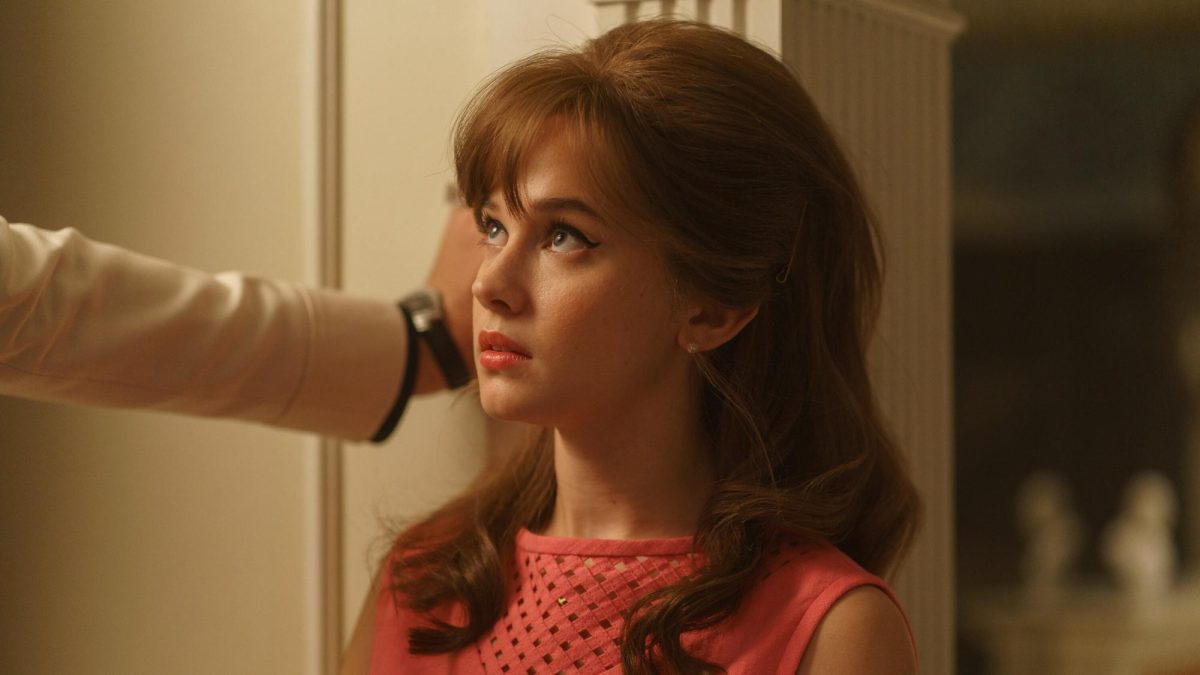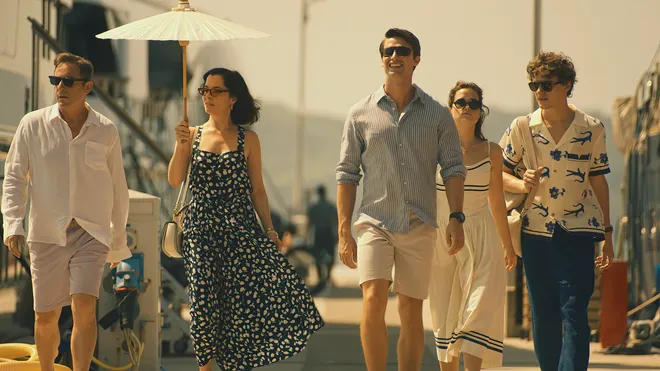Screams and cries create a perfect hysteria of adoration. But in the push and shove for a rockstar’s heart there’s hardly room for someone silent.The newly released movie “Priscilla” is an in depth biopic of none other than American royalty Priscilla Preseley herself. The film is based on her autobiography “Elvis & Me,” and came out just a year after Baz Luhrmann’s 2022 film “Elvis”: a movie filled with show-stopping qualities. But the similarities of these movies end pretty much with their titles, as they have tremendous differences in substance and style.
Simply no one else could create the quiet, muted layer that “Priscilla” adds to the story of this famed couple other than its director, Sophia Coppola. If you have ever heard of Coppola, you likely know that her movies are both utterly beautiful and out of touch with reality.
Everything in her films feels like a lovesick dream, the director becoming iconic for her lonely dreamscapes as seen in “Lost in Translation”, “Marie Antoinette”, and “The Virgin Suicides” – and also criticized for focusing her stories on delicate untouchables which are most often teenage girls trapped with an excess of privilege and things.
Her obsession with this specific type of life most clearly points to her own experience having grown up in the limelight of her director father, Francis Ford Coppola. Havin been born into such Hollywood royalty gave her all of the luxury and loneliness associated with fame and little of real life. It is only right that this dreamy facade is blanketed over the story of Priscilla Preseley, who fits the mold of “Coppola character” so well that Priscilla herself specifically entrusted Coppola with the task of telling her story.
Immediately within the first cut, Coppola screams at you with her stunning textures as the frame focuses on pristine manicured nails, the famed black bouffant and the practiced painting of a bold liner sealing Priscilla into “her look” that was entirely created by Elvis’ desires.
Who would bear this legendary hairdo in “Priscilla” but the young actress Cailee Spaeny, and always towering above her is the almighty Elvis played by Jacob Elordi. The near foot and a half height difference is just an added bonus to what their performances already well capture: that the dominating presence Elvis held allowed no room for Priscilla beneath the shadow of his mighty figure.
Elordi definitely had big shoes to fill in front of Elvis fans because of his most recent predecessor Austin Butler in 2022, but he managed to master the classic drawl and provide the singer’s intoxicating persona just to the point of well done.
Every frame, look, and line appears polished and intentional in this film. Most dialogue between Priscilla and Elvis resounds around Spaeny’s recurring doe eyed “I miss you”s and Elvis’ distant and dismissing replies, which only furthers the feel of the child that Priscilla really was.
Priscilla, in fact, for the majority of the movie was silent. This artfully lent itself to the fact that she was utterly alone most of her career as Elvis’ wife. The often dull days may be seen as boring, but they in fact just magnify the subtleties of Priscilla’s conflicted emotions towards Elvis.
She took every chance she could to be with her lover when he wasn’t hundreds of miles away, which mostly consisted of partying the nights away with Elvis and his boys’ club of his “Memphis Mafia.”
But those scenes of togetherness were always stark, as they sped by in a whirlwind and were often placed immediately preceding early mornings of school. Let’s just say it’s hard to concentrate on your algebra test when yours and America’s sweetheart is downstairs having a rowdy party without you.
Elvis Presley Enterprises actually forbade Coppola from using Elvis’ music in the film, likely due to the way “Priscilla” framed Elvis as pretty heavily flawed. However, it did anything but take away from the film, in fact it did it a favor by providing a unique soundtrack that didn’t point extra focus to Elvis’ stardom and included some of the historical tracks mentioned in Priscilla’s “Elvis & Me.”
Other than the occasional heated office phone call, you’d hardly know that Elvis was a singer from this film. There’s only one scene of him in his element in the entire movie and it’s a shot from the lower back of the stage, only his iconic silhouette making it Elvis. Once again, the perspective is from the background – the perspective of Priscilla.
The story of “Priscilla” is not one of anger or vengeance: it’s a tragedy for all those involved. That is one of the crucial things that was missed by a great deal of people; this movie is not here to take hits at Elvis. Priscilla herself made it clear that Elvis was the love of her life. The movie ends abruptly after Priscilla has the conversation of divorce with Elvis.
We then see Priscilla driving herself (for a change) out of Graceland. Leaving behind all that a woman “could ever want.” Yes, it would be nice to see scenes following that depicted a strong Priscilla taking back her own and living her own life. But I believe that was ultimately not the purpose of the movie – the purpose was to depict the Priscilla that was created by Elvis from when he first laid eyes on her. This absurdity of glamour is what makes people pine for their icons – their unbelievably unearthly presence that makes them so untouchable.
I believe this is why there has been such a rough and tumble popular reception of this movie and
Categories:
“He was the love of my life.”
The narrative of “Priscilla”
Gemma Aiello, Staff Reporter
December 12, 2023
0
Donate to Talisman
Your donation will support the student journalists of Ballard High School. Your contribution will allow us to purchase equipment and cover our annual website hosting costs.

























